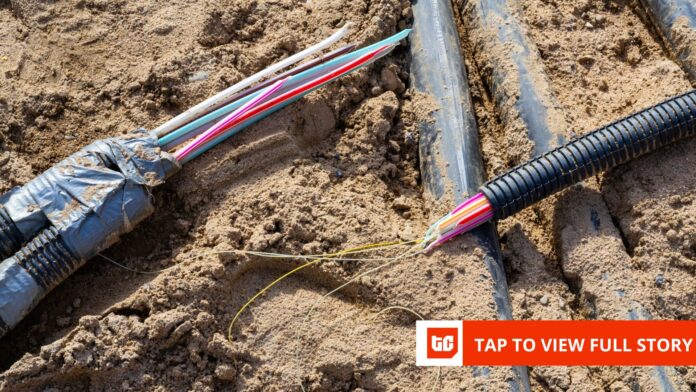In June 2024, Nigeria passed the Designation and Protection of Critical National Information Infrastructure Order, which classified telecom infrastructure such as fibre cables and data centres as critical national assets and made their protection a matter of security. One year later, Nigeria is experiencing record levels of network disruptions and fibre cuts, raising questions about how the policy was implemented.
According to the Nigerian government, between January and June 2025 there were 349 major network failures, which is an average of two per daily. Uptimeis a website for network monitoring launched by the Nigerian Communications Commission. The number of disruptions in May was the highest so far in this year.
During the first 12 days in June, 19 more outages occurred, 11 of which were caused by fibre cut, seven by power failures and one by equipment vandalism. These outages have affected many states in the country including Borno and Kaduna. They have also affected Imo, Akwa Ibom and Imo, Rivers and Anambra. They have also disrupted essential services like voice calls, USSD banking and internet connectivity.
Industry dissatisfaction grows
Gbenga Adebayo, chairman of the Association of Licensed Telecommunication Operators of Nigeria ALTON, acknowledged the delay of implementing the CNII Framework. “I must admit that we have been too late in getting the CNII Order operationalized,” he said. This is due to the back and forth between stakeholders. This delay is costly.
Telcos in Lagos alone lost N5 billion ($10.8m) due to over 2,500 fibre cuts. MTN Nigeria spent N11.1bn ($24.11m) between 2022-2023 to repair and reroute over 2,500 km of fibre-optic cable. This money could have been used to expand network infrastructure in underserved areas. In 2023, the telecom industry lost approximately N27 billion ($58.6million) due to fibre-related damage. These losses are not just financial. Every fibre cut delays service to banks, hospitals and government offices. Glo’s fibre cut in Abia & Rivers state in June 2025 left subscribers without USSD, SMS, voice, or data service for almost an hour. Airtel also faced a similar challenge, resulting in a disruption of over an hour, in Anambra & Imo. These outages have far reaching economic consequences. They undermine confidence in digital services, and they stall digital transactions.
Wider risks to the economy
These network failures pose a direct threat for businesses that rely on cloud computing, digital payment, and remote working.
In May 2025’s final week, fibre cuts in Kebbi and Sokoto, Zamfara and Yobe, brought business to a halt. Residents were unable to access basic telecom services. Banks struggled with failed USSD transaction, and healthcare providers had no access to telemedicine platforms. Recognizing the economic risks, certain states are taking steps in order to support telecom operators.
Suleiman Isah is the Commissioner for Communication Technology and Digital Economy at Niger State. He said that this was one of the reasons why they eliminated Right of Way fees. “We’ve partnered with the NCC and the telecom providers to coordinate the Ministry of Works and Water Resources so that there is advance notice before any construction which could impact fibre routes.” But fibre cuts are on the rise. On May 8, 2025 a Globacom fiber line that ran through Kebbi and Niger to Sokoto was severed. This caused internet access to be unavailable in several communities for almost three hours. On June 10, a similar incident in Niger State disrupted voice, data, and SMS services across eight communities. It took more than two hour to fix.
Repair time varies widely, from 30 minutes to several days, depending on terrain, accessibility and the state or infrastructure supporting the repair, such as roads or drainage systems. Each lost hour undermines economic activity, customer confidence, and Nigeria’s larger digital transformation goals.
Promises of progress
According to the CNII Order, willful damage to telecom infrastructure is a serious crime punishable by up to 10 years in prison. It also called for minimum standards of protection, coordinated information-sharing, and enforcement by the Office of the National Security Adviser and the Nigeria Security and Civil Defence Corps. These measures are yet to produce tangible improvements.
Adebayo said stakeholders–including ALTON, the NCC, the Ministry of Communications, Innovation and Digital Economy, ONSA, and NSCDC–have now reached consensus on the best approach for implementation.
Recently, the NCC signed a Memorandum of Understanding with the Ministry of Works in order to protect fibre infrastructure when road construction is underway. Adebayo stated that “you will soon see the implementation of what has been worked on”. Mark your calendars for
Moonshot by TechCabal will be back in Lagos, October 15-16! Join Africa’s leading founders, tech leaders, and creatives for 2 days of keynotes. Early bird tickets are now 20% off — don’t sleep! moonshot.techcabal.com.


